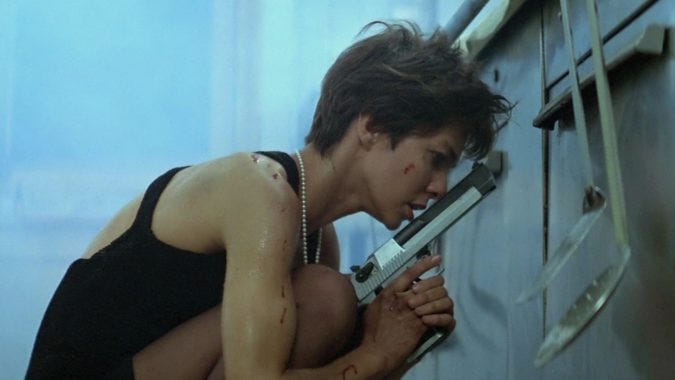La Femme Nikita (1990)
While often grotesque, this exquisite example of Cinéma du look x "Pygmalion" is strangely apposite for the post-COVID world we're stumbling into blinkingly.
Originally published on my Substack June 13, 2021
Movies have been a welcome escape from the comfortable ennui of life under travel bans, lockdowns, and social distancing. I’ve been drawn to films that are explicitly nostalgic (I’ve seen more Westerns in the last year than I care to admit to) and kept my distance from anything psychologically challenging or too contemporary (I haven’t had the heart to put on any of my favorite Denys Arcand flicks for fear of catching a fatal dose of Montreal nostalgia).
But now in spring we are coming back to ourselves. I’m having the utterly surreal experience of awakening from fretful dream which began in April of last year and ended in March. I traveled to see friends and generally misbehave in New York and LA in March and April respectively; in the interval I watched Nikita.
In his characteristically gnomic way, Dylan might have been preoccupied with filmmaking when he wrote “Pistol shots ring out in the baroom night,” so often does it relate the opening scene of the thriller. But here the parallels with Hurricane cease. For Nikita, murder brings her out of a stygian nightmare of addiction and crime to her metamorphosis into an elegant government assassin (the irony is both bitter and clumsy, thankfully the characters never talk about it).

(This is what the glitterati are wearing now but I suspect we’ll start seeing more Desert Eagle Mark I’s this summer)
Our homicidal persephone is played by Anne Parillaud in a performance that is difficult to imagine being carried off by any other actor. There is nothing subtle about her portrayal, in some sense very little to bridge her manic leaps from playful bohemian, to vicious killer, to panic-stricken animal, though each episode is in its own way a little masterpiece. Her lack of demur in seducing the checkout clerk at the grocery store is so tender that we cheerfully forgive the incongruity.
Fortunately the director Luc Besson is not particularly concerned with subtlety either - it’s all about the look. As anyone familiar with his subsequent film Léon: The Professional will understand, Besson does not allow himself to be shackled by conventions like character development, plausibility, and consistency. Like many of us he is content with stylized post-punk violence, self-referential dialogue, and nihilist-chic vibes. And if this isn’t your milieu, you will find nothing redeeming about this movie.
If it is, you’re in for two hours of sublime entertainment where everyone is dressed like they’re out for an evening in contemporary SoHo (and strutting around with brazen confidence instead of crouched over their iPhones). People smoke and wear black. They drink vintage champagne in the baroque splendor of Le Train Blue. Everything is permitted, most importantly your complete and utter enjoyment.